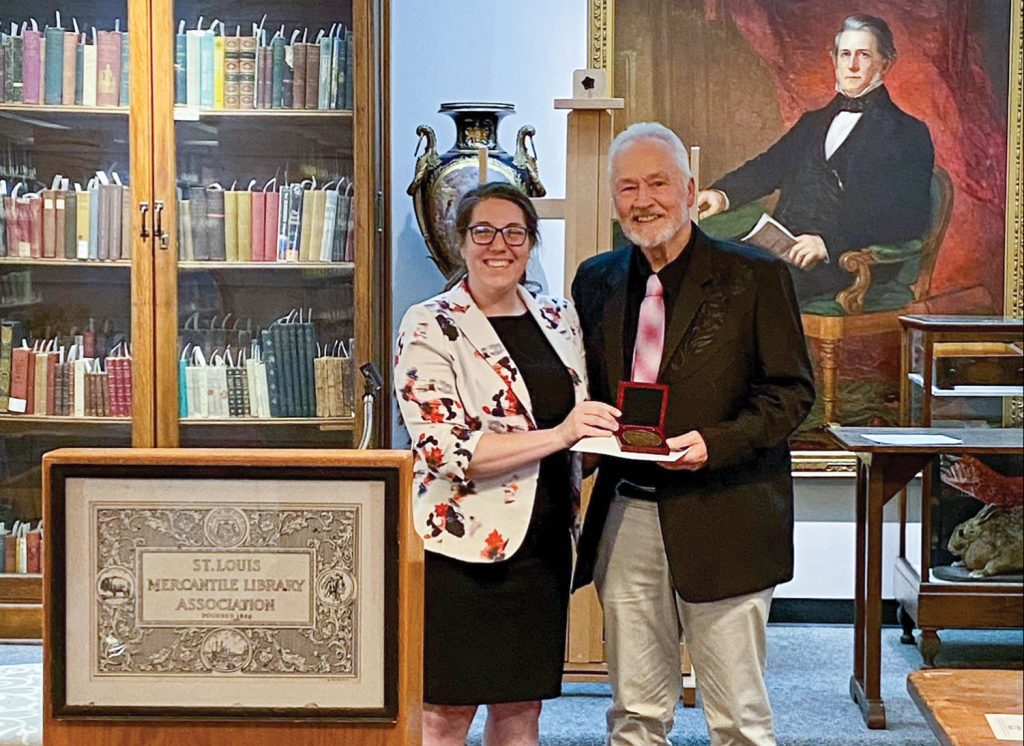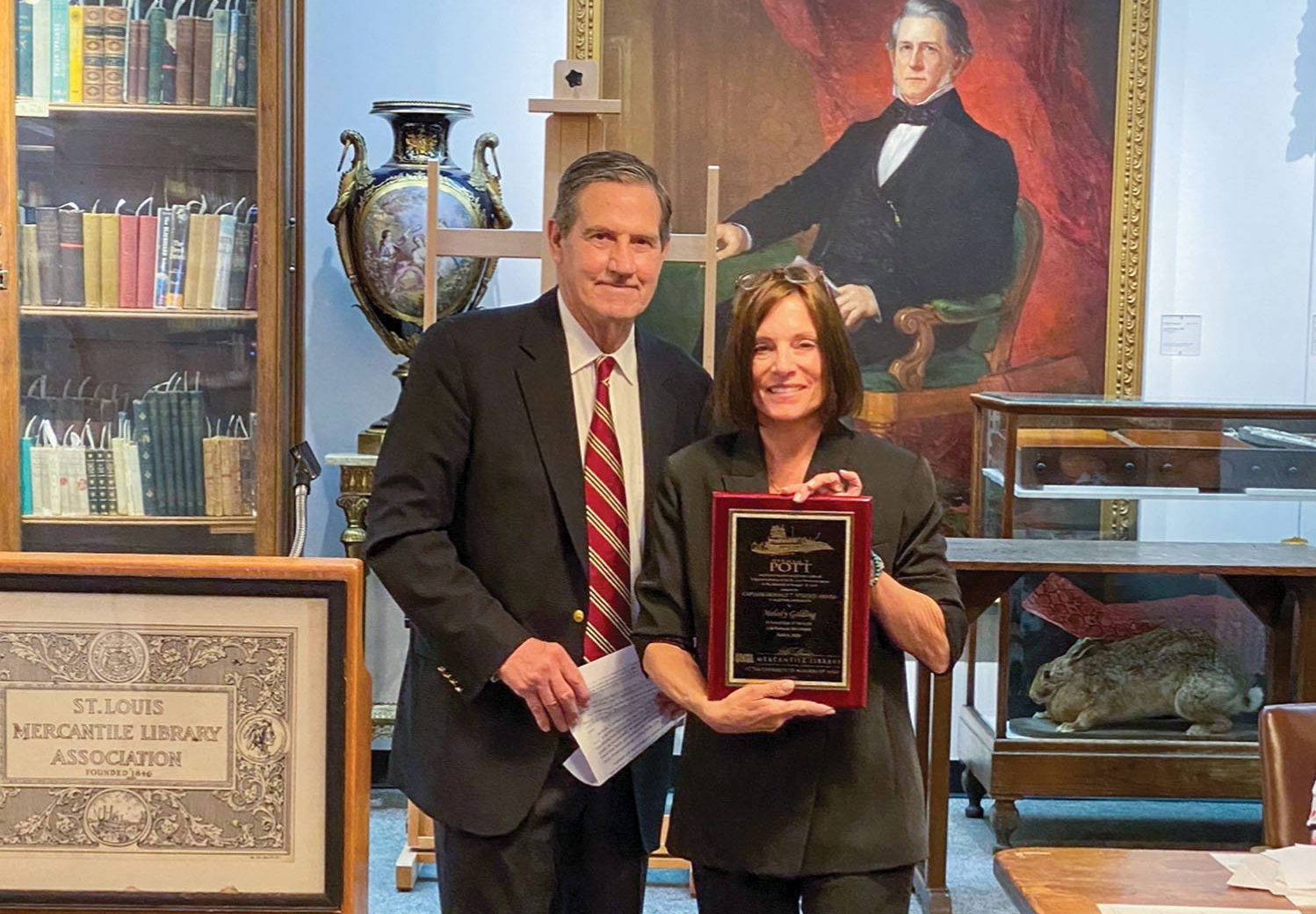The Herman T. Pott National Inland Waterways Library, a special collection of the St. Louis Mercantile Library, recently recognized two individuals whose work has contributed to a better understanding of the American inland waterways. The Donald T. Wright Award was presented to Melody Golding for her book Life Between the Levees, America’s Riverboat Pilots, while the James V. Swift Medal was awarded to Gregg Andrews for his book Shantyboats and Roustabouts: The River Poor of St. Louis, 1875-1930. The award presentations were held April 6 at the Pott Library.
An internationally recognized photojournalist from Vicksburg, Miss., Golding is married to the owner of multigenerational Golding Barge Line, a family-owned business, and has heard more than her share of stories about life on the river, but none she knew of had been recorded for posterity. For some reason, said Nelson Spencer, chairman of The Waterways Journal, in his introduction of her, stories about the river just simply bear telling, and most go unrecorded. Now, someone has taken the time and effort to set them down in writing and preserve them for the future.
Equipped with an assortment of cameras, notebooks and a tape recorder, Golding spent no less than 10 years interviewing more than 100 towboat pilots, ship pilots, cruise pilots and Coast Guard pilots, traveling to river towns, and often riding the boats to talk to the men and women whose recollections she sought.
Life Between the Levees begins with a narrative of a riverman who was born in 1915 and worked on the sternwheel steamboat Reliance, wheelbarrowing coal to the steam engines. It ends 300 pages later with the words of a pilot born in 1987, who runs excursion vessels with all the modern tools of navigation.
Not only do the stories provide the reader with a sense of the progress that’s taken place in towboat life over the years, but they paint an entertaining picture for the people who make their living on the river. One storyteller recounts a foggy night on the Atchafalaya River when the crew of a towboat tried to tie the boat off on a stump only to find out, when they threw the line, that it was a bear curled up on the bank. Another time, during the interview, a pilot from a company other than Golding Barge requested that Melody take a photo of his tattoo. It was the company’s logo, he said repeatedly, despite her polite refusals. Undeterred, Golding told the packed room, the pilot revealed the logo anyway, which, as she suspected, had been etched on his derriere.
Others’ similar experiences add to the richness of the book. Interspersed throughout are Golding’s colorful photographs. “Please know,” Golding writes in the forward, “the reflections within this book are a very rare look into the personal lives of those who have dedicated themselves to the river. It is authentic, honest, sometimes funny, outrageous, often sad, and even tragic, as is true with all real-life stories no matter the profession. It is a slice of genuine American folklore.”
Melody Golding’s two previous books, Katrina and Panther Tract, were acquired in part by the Smithsonian Institution. Her photographs, published in various national and international journals, are on display at the Department of Homeland Security and have been featured in solo exhibitions at numerous universities and museums.
Life Between the Levees, America’s Riverboat Pilots is sold on Amazon and can be bought through the University Press of Mississippi. All proceeds go to the Seamen’s Church Institute.

Gregg Andrews
The recipient of this year’s Swift Medal, Dr. Gregg Andrews, is a distinguished history professor emeritus at Texas State University, a former National Endowment for Humanities Fellow and a prizewinning author of six books, including City of Dust: A Cement Company Town in the Land of Tom Sawyer and My Daddy’s Blues: A Childhood Memoir from the Land of Huck and Jim. Andrews is also a singer-songwriter who fronts the swampy blues band Dr. G and The Mudcats.
As introduced by Sara Hodge, curator of the Pott Library, before the standing room only crowd, “(Andrews’) book explores waterfront settlements and shantyboat colonies facing pervasive harassment and forced evictions, communities not unlike the one his grandmother lived in. At the same time, he examines the lived experiences of Mississippi roustabouts so often brutalized and dehumanized by a waterways labor system that carried with it the vestiges of American slavery.”
In accepting the award, Andrews repeatedly spoke of how “rough” his childhood had been, growing up in a shantyboat town in the Mississippi River bottoms near Hannibal, Mo., where “if you didn’t have both eyes open,” you were likely to be shanghaied by railroad agents to be put to work.
As to the reason he wrote the book, he says, “The retirement years in Hannibal rekindled interest in my family’s history on the river and the mysterious dilapidated boats abandoned on the water’s edge of my faded memory. In a quest to put my ancestral river heritage into a broader cultural context, I searched for a deeper understanding of the harassment and waterfront evictions of the shantyboat levee dwellers.”
In his chapter on roustabouts, such familiar names as captains Buck Leyhe, “Stogie” White and “Steamboat Bill” Heckman are among those mentioned in the book.
Unable to visit St. Louis in person due to COVID-19, prior to the awards presentation, Andrews relied on Hodge to assist him in much of his research, saying he owed a special debt of gratitude to her.
The 323-page book was published by Louisiana State University Press in 2023 and is available in most bookstores or from Amazon.com.
Caption for top photo: H. Nelson Spencer, chairman of The Waterways Journal, presents Donald T. Wright Award to Melody Golding. (Photos courtesy of St. Louis Mercantile Library)



